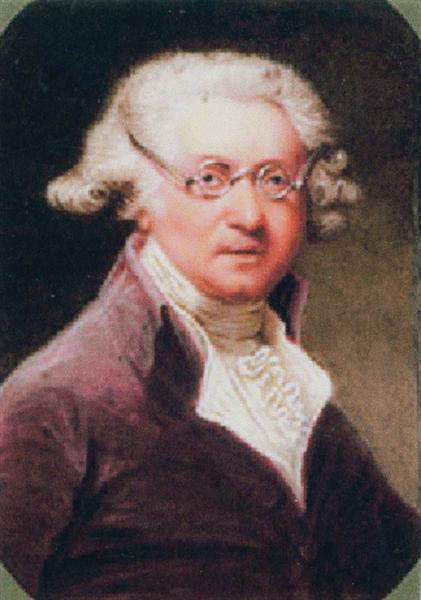Descrizione
In the field of portraiture and somewhat autobiographical painting, Joshua Reynolds' Self-Portrait, painted in 1788, stands as a significant work that encapsulates both the artist's technical mastery and his introspective approach. Reynolds, a prominent English painter and one of the founders of the Royal Academy, was dedicated to capturing not only the external appearance of his subjects, but also their essence, which is clearly reflected in this self-portrait.
In the work, Reynolds presents himself in period dress that reflects his status as a respected academic and artist. The choice of a dark coat, with a slight touch of elegance in its cut, and the use of a white shirt with a large collar, offers an image that is both austere and dignified, suggesting an air of authority and thoughtfulness. The painting’s surroundings, which appear to be a studio, are hinted at in the background, adding context that emphasises the intimate relationship between the artist and his craft.
The composition is notable for its finesse in capturing the figure and gestures. Reynolds is positioned slightly three-quarters, a choice that allows the viewer to enter into a visual dialogue with the portrait. His gaze is directed toward the viewer, offering a direct connection that invites contemplation. This eye contact is a key feature of Reynolds' portraits, as he often sought to establish an emotional relationship with the viewer of his work.
In terms of colour, the self-portrait is characterised by a rich and balanced palette. The dark tones of the coat contrast with the luminous white of the shirt, which not only gives vitality to the figure but also highlights Reynolds's skill in playing with light and shadow. The way the light illuminates the artist's face highlights his pensive expression, a gesture that reflects the creative process and the role of the artist in the society of his time.
Reynolds, often known for his idealized portrait style, also incorporates a sense of sincerity in this self-portrait. The artist does not present himself as an unattainable icon, but rather as a conscious observer of his own humanity. This approach coincides with the principles of neoclassicism and romanticism that were influencing the art of the time, where the individual and his feelings were beginning to be considered aspects worthy of exploration in art.
It is interesting to note that this self-portrait is one of Reynolds's last works, made shortly before his death in 1792. The thread of personal reflection and the search for inner truth applied in this work can be read almost as a testament to his artistic legacy. In his capacity for self-reflection, the artist situates himself in a broader tradition of self-exploration that can be found in the work of many of his contemporaries, although Reynolds brings a unique voice to this narrative.
Looking at Self-Portrait from 1788, it is clear that Joshua Reynolds manages to encapsulate in this work not only his image, but also his career, his people, and the time in which he lived. As the viewer enters into the artist’s gaze, a space for dialogue opens up that reflects both Reynolds’ technical mastery and his inner vision, making this painting a moving and enriching piece of art history.
KUADROS ©, a famous painting on your wall.
Hand-made oil painting reproductions, with the quality of professional artists and the distinctive seal of KUADROS ©.
Painting reproduction service with satisfaction guarantee. If you are not completely satisfied with the replica of your painting, we will refund 100% of your money.

